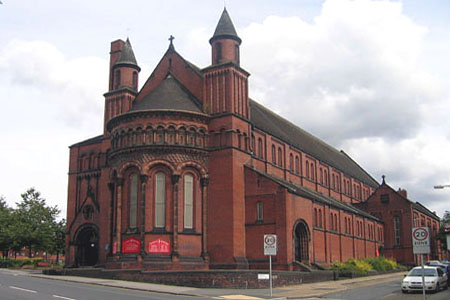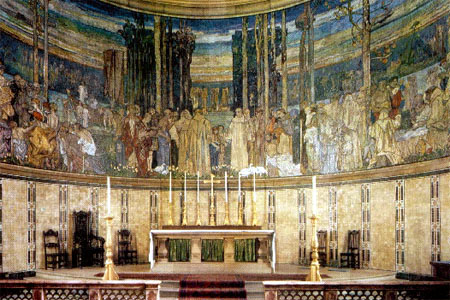| |
 |
 |
 |
| Comment on this report, or find other reports. |
 |
| Our Mystery Worshippers are volunteers who warm church pews for us around the world. If you'd like to become a Mystery Worshipper, start here. |
 |
| Find out how to reproduce this report in your church magazine or website. |
|
|
| 2248: St
Aidan's, Harehills, Leeds, England |
 |
 |
 |
Mystery Worshipper: Leo.
The church: St Aidan's,
Harehills, Leeds, England.
Denomination: Church
of England, Diocese
of Ripon and Leeds.
The building: St Aidan's was built as a memorial to Bishop Woodford, formerly
vicar of Leeds Parish Church and later Bishop of Ely, in the
1890s in Romanesque style in the form of a basilica similar
to those in Ravenna. Its most
famous feature is the huge mosaic over the high altar of scenes
from the life of St Aidan, completed in 1906 by Anglo-Welsh
artist Frank Brangwyn. The mosaic was cleaned up in 2002 after
years of candle smoke from the big six (immediately below
it) and incense had taken their toll. The font, made of Mexican
onyx and green, blue and red marble, weighs a ton and a half
and has been described as one of the finest pieces of ecclesiastical
sculpture. A huge brass lectern, with angels blowing out the
gospel to the four corners of the earth, stands near the font.
It is reportedly worth about £36,000 but, even so, there
are those (myself included) who would prefer something else.
The church: I first came to this church 40 years ago as a new student, away
from home for the first time and very homesick. I had not
been back for more than 30 years. In my day, about half the
congregation were white and middle class and travelled in
for the bells and smells. Now, the congregation is about 75
per cent Afro-Caribbean. Although St Aidan's has an Anglo-Catholic
ethos, it is far from prissy or conservative. Along with the
nearby Roman Catholic church, it sponsors a Society of St
Vincent de Paul group, dedicated to tackling poverty and disadvantage
by providing direct practical assistance to anyone in need.
It also carries on a strong involvement in a community project
that provides English lessons and computer resources to asylum
seekers and refugees.
The neighbourhood: Harehills is an inner-city area a mile north-east of the Leeds
city centre. When the church was built, this area was "New
Leeds" and relatively prosperous. I remember it as one of
the happiest places where I have lived, albeit a long time
ago. But today the area is in the top five per cent of the
most deprived areas in the United Kingdom, with high unemployment,
crime, drugs and prostitution, although recent crime statistics
suggest that the area no longer deserves its criminal reputation.
Cheap housing attracted many Commonwealth immigrants from
the 1950s onward. Roundhay Road, where the church is set,
is sometimes referred to as the Curry Mile because of its
large number of curry houses. In the 1970s the church was
surrounded by red brick, back-to-back terraced houses, but
many of these have been cleared away and replaced by a park.
The cast: The preacher and principal concelebrant was the Revd Tony Bundock.
Among the other concelebrants were two women priests (for
this is a Forward-in-Faith free zone) and the Revd Canon Alan
Taylor, vicar since 1983, and who is also Liberal Democrat
councillor for the area and Lord Mayor of Leeds.
The date & time: Sunday, 4 September 2011, 10.00am.
What was the
name of the service?
Healing Mass.
How full was
the building?
The church was built to seat a thousand. (It can comfortably
seat 500 but I have seen it packed out with many more when
extra chairs have been added.) But there were only about 30
when I arrived five minutes before the service. By the gospel,
there were 101. People walking in late was always a feature
of this congregation, a fact that I had forgotten. But that
is good because it feels like home.
Did anyone
welcome you personally?
A woman asked, "Do you want a book?" My friend, who had forgotten
his specs, said he'd share. But she insisted, "Oh no, you
can't share!" and handed him a book with a "Here."
Was your pew
comfortable?
Chairs with plenty of kneeling space. However, in the modern
Catholic fashion, there was hardly any kneeling.
How would you
describe the pre-service
atmosphere?
Quietly expectant. Any conversation was whispered.
What were the
exact opening words of the
service?
"Welcome to mass today, especially if you are a visitor."
What books did
the congregation use during the
service?
Celebration Hymnal
for Everyone.
What musical instruments
were played?
Organ.The organ dates from 1896 and was built by Leeds organ
builder James Binns (though a more famous organ of his is
in St Bartholomew's, Armley, across the other side of the
city). Its console is reached by ascending many steps and
is not for those afraid of heights, although I am informed
that the current vicar has a very accurate aim with chocolate
mini-eggs at the end of the Easter Sunday mass.
Did anything distract
you?
Someone very good-looking in front of me, but that's part
of the worship. Also being conscious that my friend, who is
not a believer, has a very sharp awareness for inauthenticity
in church services and I was wondering what he was making
of this mass.

Was the worship stiff-upper-lip,
happy clappy, or what?
Relaxed, homely yet dignified bells and smells. Because many
different languages are spoken in this community, the gospel
was also read in French. On some occasions it is read in Shona.
The laying on of hands for healing was speedily accomplished
by three teams of three ministers. The sharing of the peace
was a time of general walkabout, in contrast to my day when
it wasn't allowed.
Exactly how
long was the sermon?
7 minutes.
On a scale of
1-10, how good was the preacher?
6 – Father Bundock preached from behind the altar and
his voice was not very exciting. I am sure that he has preached
better sermons and that he was somewhat hampered by the need
to be brief because of the laying on of hands that was to
follow.
In a nutshell,
what was the sermon
about?
Just as men are often reluctant to see their doctors, so we
are reluctant to face up to our sins, but they can be easily
sorted out. We don't have to buy into the cult of perfectionism
because it is Christ's perfection that is the bridge between
us and God.
Which part of
the service was like being in
heaven?
All of it. From the moment I walked into this huge building, my mind was
flooded with memories of all the people, many of whom have
since died, who made me feel at home in this church and who
had invited me for meals and to the pub.
And which part
was like being in... er... the other place?
The same thing. Memories of a past that cannot return but
which has made me the person that I am today. Sadness mingled
with joy.
What happened
when you hung around after the service looking lost?
No chance to look lost. On my first visit, all those years
ago, someone asked, "Eh love, are you new?" It's the same
now. Three people actually remembered me and introduced me
to others. I normally hate coffee hour in churches but I did
not get away from this one for 45 minutes.
How would you
describe the after-service
coffee?
Lukewarm tea – my fault because I was chatting to so many people
that I got there after the coffee had run out and this was all that was
left. The lukewarmness of the tea was more than made up for by the
warmth of the person who poured it.
How would you
feel about making this church your regular (where 10 = ecstatic, 0 =
terminal)?
10 – The Catholic movement within the Church of England
has been accused of being obscurantist and misogynist. This
is demonstrably untrue insofar as this church is concerned
because it is very incarnate and inculturated within its parish.
Did the service
make you feel glad to be a
Christian?
Yes.
What one thing
will you remember about all this in seven days' time?
My memories of a good experience here in the past coupled with my joy
that this church still thrives today. |
|
|
 |
 |
 |
| We rely on voluntary donations to stay online. If you're a regular visitor to Ship of Fools, please consider supporting us. |
 |
 |
 |
| The Mystery Pilgrim |
 |
| One of our most seasoned reporters makes the Camino pilgrimage to Santiago de Compostela in Spain. Read here. |
 |
 |
 |
| London churches |
 |
| Read reports from 70 London churches, visited by a small army of Mystery Worshippers on one single Sunday. Read here. |
| |
|
|
|
|


